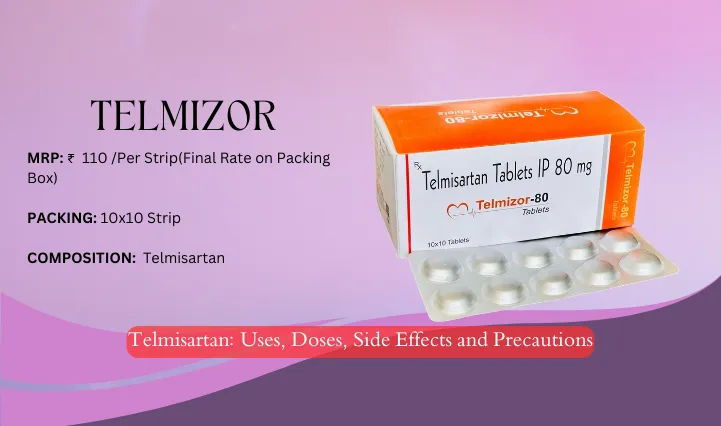Telmisartan Uses, Doses, Side Effects and Precautions
Telmisartan is a medication that is used to help lower blood pressure as well as reduce the risk of cardiovascular diseases. The medication works by reducing the blood vessels, improving blood flow, and lowering blood pressure. The medication is an Angiotensin II Receptor Blocker (ARB) which means that it works by blocking the actions of the hormone called Angiotensin II. This hormone is responsible for the constriction of blood vessels. This blog discusses the Telmisartan uses, doses, side effects, and precautions.
Telmisartan Working
Telmisartan is an angiotensin II receptor blocker (ARB) used to treat high blood pressure (hypertension) and prevent cardiovascular issues like heart attacks and strokes.
How Telmisartan Works
Telmisartan works by blocking Angiotensin II Receptors. Angiotensin II is a hormone that increases blood pressure by narrowing blood vessels. This medication relaxes blood vessels.
This medication helps protect the kidney in the following ways:
- It reduces the pressure in kidney blood vessels as well. This decreased pressure helps prevent kidney damage.
- It helps decrease protein loss through urine.
- High levels of angiotensin II can lead to kidney inflammation and scarring. By blocking these hormones, it prevents kidney damage.
- It decreases sodium and fluid retention.
- It slows down the progression of chronic kidney disease.
Telmisartan Uses
Telmisartan uses to treat a variety of heart diseases and kidney diseases. The diseases it is used to treat are –
Telmisartan uses in Hypertension (High Blood Pressure) to lower blood pressure to prevent heart attacks and strokes.
- Heart Failure by reducing the strain on the heart.
- It slows down the progression of Chronic Kidney Disease.
- It is used for the prevention of Heart Attacks & Strokes in high-risk individuals.
- It prevents Diabetic Nephropathy.
Telmisartan Side Effects
While this medication is usually well tolerated, however, some people may experience some mild side effects. These side effects are as follows –
- Dizziness or lightheadedness
- Fatigue or weakness
- Low blood pressure (hypotension)
- Back pain
- Diarrhea
Telmisartan Serious Side Effects
Some of the serious side effects of this medication are as follows –
- Severe drop in blood pressure (fainting)
- High potassium levels (irregular heartbeat, muscle weakness)
- Kidney problems (reduced urine output, swelling)
- Allergic reactions (rash, itching, swelling of face/lips)
Telmisartan Doses
Telmisartan is a medication that is available in a variety of concentrations. The dosage varies from condition to condition. The following table contains an overview of the conditions, the recommended dosage, and the maximum dose.
| Condition | Recommended Dosage Adult Dosage | Maximum Dose |
| High BP | 20–40 mg once daily | 80 mg per day |
| Heart Failure | 40 mg once daily | 80 mg per day |
| Cardiovascular risk reduction | 80 mg once daily | 80 mg per day |
| Diabetic Kidney Protection | 40–80 mg once daily | 80 mg per day |
The dosage and frequency may be further personalized for elderly patients, especially if a patient has been prescribed other BP medications. The patient should drink a lot of water and take the medication at the same time each day for the best results. It can be taken with or without food.
Telmisartan Storage Guidelines
To maintain the effectiveness of ofloxacin tablets they should be stored in the following manner.
- They should be stored at a temperature of 20-25 degrees Celsius. Avoid storing them in the freezer or excessively hot places.
- They should be stored in a dry place away from humidity.
- They should be stored away from direct sunlight as they can degrade due to UV light.
- It is best to store the medication in its original packaging.
- It should be kept away from children and pets.
Telmisartan Disposal
Telmisartan tablets should be disposed of in a safe manner. These tablets should not be flushed down the toilet and local guidelines with regards to the disposal of the medication should be followed.
Telmisartan Precautions
This medication may not be suitable under the following conditions-
- Pregnant and breastfeeding women.
- Kidney and Liver disease.
- People with high potassium levels.
- Patients can get dehydrated easily.
Telmisartan Drug Interactions
Telmisartan is known to interact with the following medications,
- Diuretics (Water Pills)
- NSAIDs (Ibuprofen, Diclofenac, and other similar painkillers)
- Potassium Supplements or Potassium-Sparing Diuretics
- Other BP Medications (ACE Inhibitors, ARBs)
Frequently Asked Questions
Ans. The symptoms of an overdose of Telmisartan are extreme dizziness, fainting, and rapid or slow heart rate. If a patient is experiencing these symptoms it is best to seek immediate medical attention.
Ans. It reduces around o 15.5 and 10.5 mm Hg of blood pressure.
Ans. Unusual pain, tightness, skin ulcer.
Ans. Adults
18–39 years
Normal blood pressure for women is 110/68 mm Hg, and for men, it’s 119/70 mm Hg
40–59 years
Normal blood pressure for women is 122/74 mm Hg, and for men, it’s 124/77 mm Hg
60+ years
Normal blood pressure for women is 139/68 mm Hg, and for men, it’s 133/69 mm Hg
Children
6–13 years
The normal systolic range is 80–120 mm Hg, and the normal diastolic range is 45–80 mm Hg
14–18 years
The normal systolic range is 90–120 mm Hg, and the normal diastolic range is 50–80 mm Hg
Ans. Telmisartan has better feedback from patients.
Disclaimer: The information on this blog is strictly for informational purposes. It is not a substitute for professional medical advice. Please consult your doctor before taking any medication.

